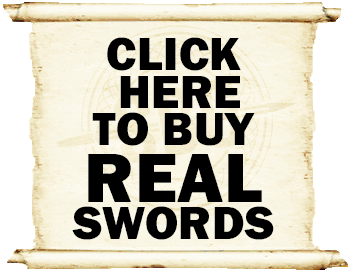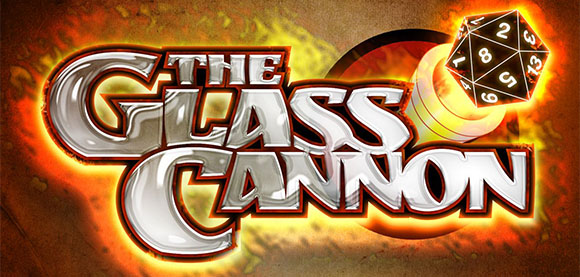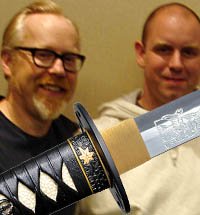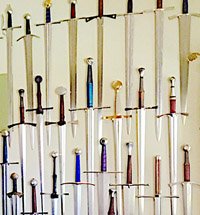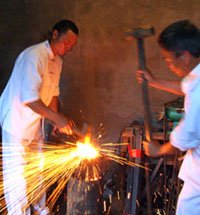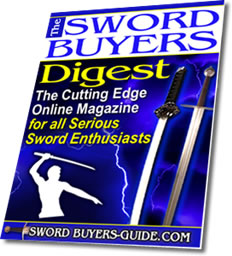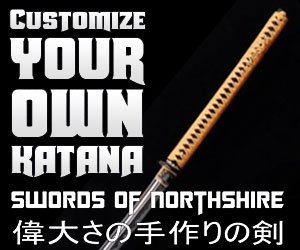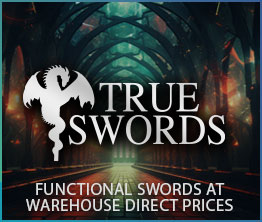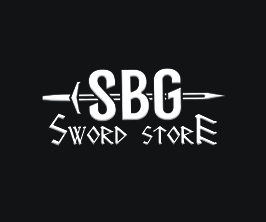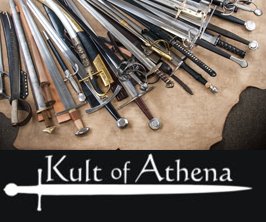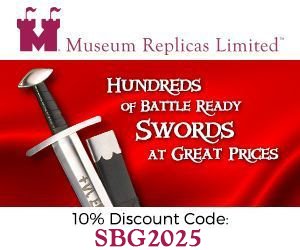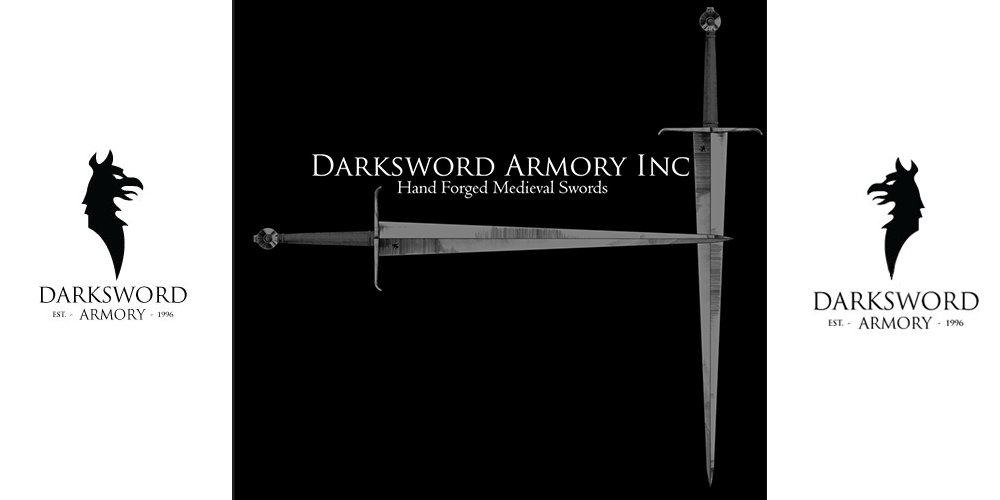Recent Articles
-
July Issue of the Digest Out Now
Jul 01, 25 01:22 AM
The Glass Cannon Podcast Interview
The Glass Cannon Podcast Interview with Troy Lavallee and Joe O'Brien by Daniel Dacombe, first appearing in the July 2017 edition of the Sword Buyers Digest Online Magazine..
SBG: First of all guys, thanks so much for taking time out of your busy schedules to do this! So good to have you here.
Joe: It’s my pleasure, Daniel. Thanks a lot for having us!
SBG: Now, for those of our readers who are NOT into tabletop gaming, we have two quick questions – what is Pathfinder, and why is it superior to all other forms of gaming?
Troy: When people ask me what game we're playing, I usually open with, "Well, did you ever play Dungeons & Dragons as a kid? You did? Well, we play a game that's similar to that, but much much more refined." Then I start talking about all the ways in which the current iteration of D&D is inferior to Pathfinder in every single aspect until the person stops paying attention and/or falls asleep. If they NEVER played a tabletop role-playing game before, all I say to them is, "Imagine playing a game where all you need is a pencil, some dice and your imagination. You create a character and literally anything you can think of doing is possible and then rectified by endless amounts of rules that you learn over time. You sit around with your friends and basically improvise a story where fate is represented by the outcome of dice rolls." Who wouldn't want to at least try that once, besides my wife?!?!
Joe: That’s not an easy one to answer quickly. Pathfinder is a roleplaying game (RPG for short) in which the players each control a character in a cooperative campaign, usually with an epic fantasy setting and usually against the master plan of some great villain. Typically, one player called the Game Master controls the Villain and all his/her henchmen and the rest of the players work together and control the “good guys.” The design of the game allows for both classic board game style tactics (“I move 4 spaces and attack with my sword”) as well as extensive rules for story interaction (“I roll a die to see if I can lie my way through the interrogation”). What you end up with is a hilarious and sometimes dramatic series of events that are controlled partially by dice rolls and partially by cooperative storytelling. My greatest Pathfinder games live on in my mind in the same way a great book does. It is superior to all other forms of gaming because it is an amalgamation of all the greatest games: chess, poker, backgammon, and military strategy, all rolled into one, but lives in your mind as a seamless narrative.
Joe: It’s not a simple game. Imagine telling someone
that has never played chess, poker, backgammon, or a military strategy
game how to start playing in a sentence or two? Not only are there a lot
of written rules for these games, there are almost countless pages on
unwritten rules. The same goes for Pathfinder. The nice part about
Pathfinder though is that it is cooperative. Which means that learning
together is a viable option. One player knowing more only helps
everyone, it doesn’t poison the legitimacy of the game. There are
websites where new players can get introduced to the game and start
reading about what they’ll need to play, but I personally recommend just
getting the Pathfinder
Beginner’s Box. It’s got everything you’ll
need in one box to run a simplified, streamlined version of the game for
you and 4 or 5 of your friends that have never played before.
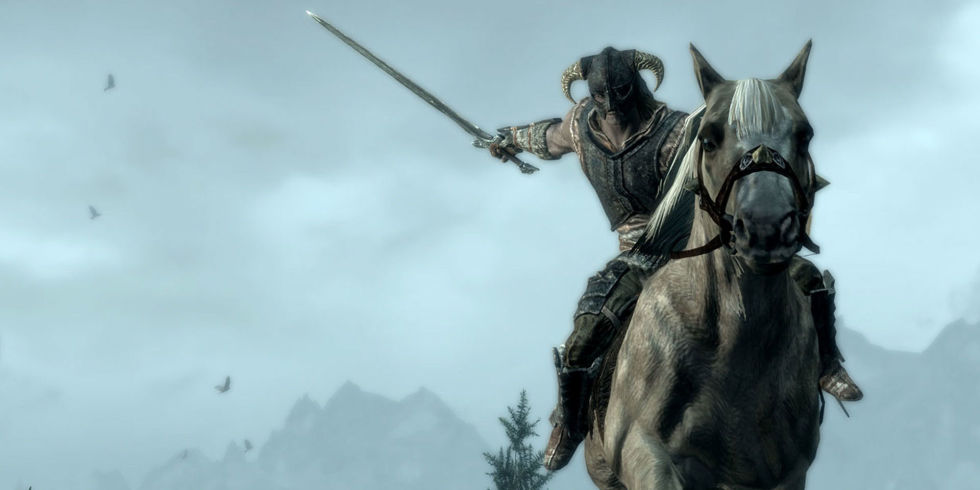 Skyrim
Skyrim
SBG: Video games these days are becoming more and more “sandbox-style” – that
is, players can go anywhere and do almost anything, which was one of
the original benefits of tabletop gaming. Do you think that tabletop
gaming still has advantages over video games, and if so – what are they?
Troy: I think the communal aspect of it is the biggest draw.
As technological innovations are making people more and more insular in
their connection to the world, I think the human need to get in a room
together is what has helped with the resurgence of tabletop RPGs. People
don't even talk on the phone anymore, they text.
Teenagers
don't tell each other stories of what they did last weekend, they send
snaps of them living their innocuous and vapid lives. Now that video
games have become so advanced, while there will still never be a
substitute for sitting down and playing a Skyrim or a Witcher 3, I think
the same can be said for tabletop RPGs.
They're back and
they're here to stay because people will always crave the human
component. Even with online franchises like League of Legends or online
options for tabletops like roll20.net or virtual tabletop, it just can't
compare to sitting in the room with your friends, playing make believe
and laughing your ass off.
Joe: Video games and tabletop games have a lot of crossover in fans and I’m one of them. I’ve played video games all of my life. I love video games. I didn’t really get into tabletop games until the last 8 years or so and I’ve found that, if given the choice, I will always choose to play a tabletop RPG with friends rather than a video game.
The huge advantage that video games have for me is that they can be played when no one else is available to play with you, which is more and more of the time when all of your friends start having kids and getting promotions. All things being equal, though, the difference between open world style games like The Elder Scrolls Series, which I love, and Pathfinder is the same as the difference between a robot and a human being. The first one sure does the math faster, but the second one is capable of unlimited imagination.
I’ll give you an example.
I was playing a Pathfinder game about 5 years
ago and after dozens and dozens of sessions over the course of 2 years,
4 friends and I played a heroic tale in which 3 of the characters were
childhood friends and now found themselves as adults facing a villain
bent on world domination. For 2 years we solved riddles, found and lost
allies, battled great beasts, walked the realms of dreams, and all the
while stuck by each other’s side. Until the final encounter. The
villain had spotted a weakness in one of us; one who had shown that he
was a bit greedier than the rest. Before the final fight the Game Master
(as the villain) put this player’s character to a choice, “stay with
your friends and die, or join me and I will make you an immortal god of
one of the realms of hell. You’ll have unimaginable power! All you have
to do is accept my offer, and the power is yours.” The player, my buddy,
thought about it for about a minute, turned to us and said, “Sorry,
guys.”
We said, “WHAT!?” Not only would he be removing his
character from the “hero’s tale” after 2 years of play, but he was
sentencing the rest of us to death (mechanically) by removing his piece
from the board. It would be like losing your queen in a game of chess!
In the video game, that villain offering that choice
is flavor, it’s
part of a script where the hero says, “Then I shall die by my friend’s
side!”. In a tabletop RPG, the player can literally do whatever they
believe their character would do. Faced with that choice, he left us,
and that was the final session. To this day, 5 years later, that
betrayal is still one of our favorite stories
to retell. I still picture his character as an immortal god of hell…and I smile.
SBG: A
lot of us in the sword collecting community got our start from fantasy
fiction - books, movies, comics, the list goes on. I'm sure that the
same would be true of you guys - what were some of your earliest
experiences with fantasy fiction? And have you ever tried to "relive"
some of those experiences in your role-playing?
Troy: I think
my earliest exposure to the genre was with those old Choose Your Own
Adventure books. Being a textbook OCD nerd, I would keep a spreadsheet
to make sure that I eventually read them cover to cover, going through
every possible permutation of quests. That led inevitably to playing
D&D 2nd Edition when I was about 11. When I stopped playing at
around 16 or 17, my interests were growing in new directions and I
missed out on reading some of the great YA fantasy fiction that everyone
reads at that age. That being said, I absolutely
bring the books that I'm reading now into the games that I run. I just missed out on a lot of those classics when I was a kid.
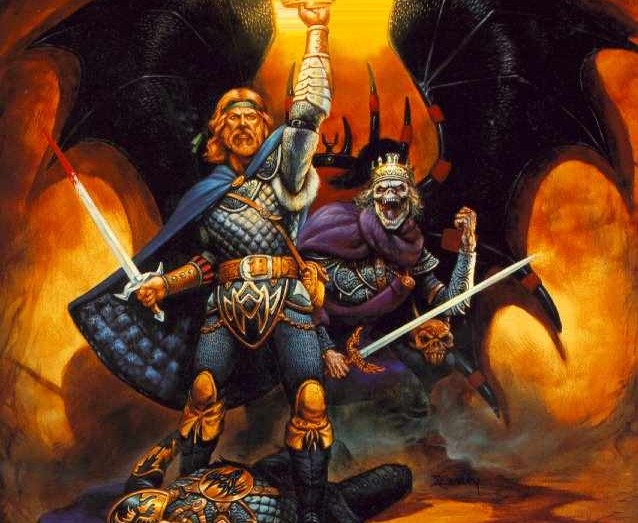 Dragonlance
DragonlanceJoe:
I started off with Dragonlance. The first fantasy novel I ever remember
reading was Kindred Spirits…the start of The Meetings Sextet. I
couldn’t tell you anything about it now, but at the time (about 7th
grade for me) I remember two things: being totally intimidated by such a
large book with such small writing (I was not the reading type), and
then, halfway through, thinking that it wasn’t long enough. I absolutely
loved the fantasy races and adventure and the companionship. Over the
years I went in and out of phases in fantasy sci-fi literature, but my
favorites that stand out over the decades would be A Song of Ice and
Fire, The Kingdoms of Thorn and Bone, The Ender Series, Hyperion, The
Stormlight Archive, Lord of the Rings, anything from Ursula Leguin,
Larry Niven, William Gibson, Carl Sagan (Contact is one of my all-time
favorites). I’m currently reading The Dragonbone Chair and it’s the
closest thing to Martin’s Song of Ice and Fire that I’ve been able to
find in the last 10 years…mostly because Martin was inspired by it when
he wrote Game of Thrones! I didn’t know that until just recently of
course.
I am always trying to relive these great stories in my roleplaying games.
Whether it be trying to recreate some version of
The Hero’s Journey, or just trying to tell a real story of unlikely
companions brought together to try, against all odds, to bring down a
tyrant. I’m always chasing a game that makes me feel
like I’m
playing the Lord of the Rings story, but it’s very difficult. Most
people don’t want to just play characters that are good anymore. The
cool kids are all playing anti-heros these days, but give me Gandalf and
the Hobbits any day!
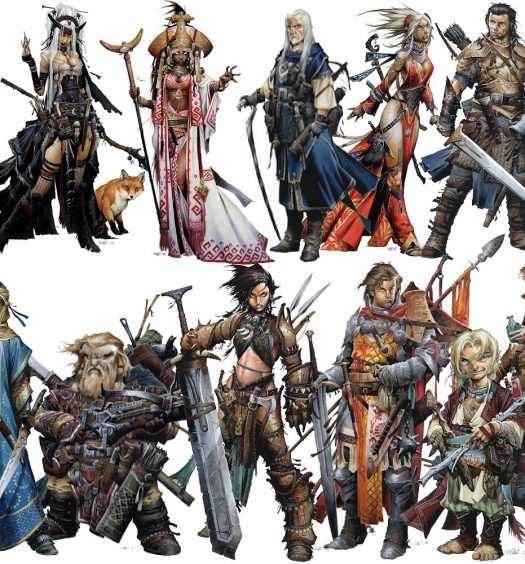
SBG: What were some of your favourite characters
you've ever made for a tabletop RPG (besides the Glass Cannon
Characters!)? Did any of those characters ever have a "signature
weapon," and if so could you tell us about it?
Troy: I only
had one main character when I was a kid. He was a monk/cleric mashup
named Yort Elaval, which is just my name loosely spelled backwards.
Sadly, that lack of creativity was transferred over to the character as
he was primarily a hand-to-hand combat spellcaster i.e. useless. Did I
mention he was also blind? I have a tendency to play casters for the
most part, but as a kid, the big joke was that everyone wanted a vorpal
longsword because if you ever got one and landed a critical hit, you
would decapitate your foe. Sadly, I never
lived long enough to get one of those, or to magically heal my blindness for that matter.
Joe:
I’m still playing a character in a long running campaign with an
eastern theme that we started about 3 years ago. He started out as a
druid (a creature based in Irish myth I think, which is a pagan sorcerer
of the forest that can summon animals for aid, or brings the plants up
around your feet to trip you), and ended up traveling to the other side
of the world. During the journey, deep in a mountain cave, he found an
ancient katana which belonged to a royal family in a fantasy version of
feudal Japan. The weapon speaks to him and trains him in the arts of
bushido. As he learns and grows, the weapon unlocks more and more
magical abilities, it’s incredibly fun. He’s now part druid, part
samurai and acts as the head guard in the entourage of someone that
seeks to return the rightful heir to the seat of the Emperor. As a fan
of Clavell’s Shogun, playing this character is like living in the book,
and the weapon immerses me into the story even more. Plus, outside the
game it’s made me more interested in the katana. In the game, its damage
output is rather mediocre from swing to swing, but it has a greater
chance than most other weapons of having a shockingly deadly strike and
dropping an opponent in one swing. I’ve found it is smarter to fight
in a more defensive way, blocking and deflecting blows until you find
the right moment to strike, rather than just hacking away like you would
with a bastard sword. It’s been a fun experience playing with an
eastern weapon. The game’s rules implement it seamlessly and it just
feels different. That’s why I love this game.

SBG: It’s no secret that your podcast has been extremely popular. How did the idea for the Glass Cannon Podcast come about?
Troy:
I came into podcasts way after they were a "thing." As a comedian, I
discovered a few podcasts by up and coming comedians and, as I was
playing a lot of Pathfinder at the time, started seeking out some
tabletop RPG podcasts. After listening to the most popular ones out
there, all I could think is that my friends and I should be doing this. I
really believed if we did it right, we could take it to the next level.
I brought the idea to Joe and Skid and the rest is history.
Joe:
Troy and I were on the road somewhere in the car, I can’t remember where
we were headed and Troy suggested we start a new game and record it. It
was as simple as that. We’d already been playing the game for a while
and we’re always ready to start a new one. The idea of recording it was a
novel one
to us, we didn’t really know anyone that was recording
Pathfinder games at the time, so it seemed like a good idea; mostly
because it would be something we’d be doing anyway. In the beginning we
even said that if it didn’t work out and no one listens to it, which was
the most likely outcome (Troy and I both had
separate podcasts in
the past that didn’t last past about 20 or so episodes), it would still
be great to have a recording of one of our games.
The idea
was simple, but the execution was not. We started drawing out a plan and
we didn’t release the first episode for another 6 months. It took a
long time to get it right.
SBG: One of the most fantasy-like
elements in the Glass Cannon Podcast is, in my opinion, the fact that
five thirtysomethings in New York City actually get together once a week
without fail. How the heck do you manage that?
Troy:
Excellent question. I have no idea. Sometimes I'm posting up a new
episode while laughing to myself thinking that the fans have no clue it
was a miracle that it even got recorded. Thankfully, we have never
missed a week since day one for over 100 weeks and that consistency has
been so key to our success. At the end of the day, it all comes down to
us realizing the need to prioritize the podcast, sometimes at the
expense of other things. I think we all really believed from the start
that we were on to something, so not having an episode ready every week
is just not an option in any of our minds.
Joe: Well,
partially it’s because we schedule out sessions well in advance and they
are much shorter than most normal Pathfinder sessions…which tend to
take a whole afternoon. We only need to release content at a rate of one
hour per week, which means weeknights after work are the go-to method
and
we’re still home at a reasonable time. The other part is that
we’ve all but stopped playing any of our other games. We didn’t know or
expect that would happen at first, but that’s how things evolved. When
we added Cannon Fodder and the Patreon rewards, the amount of work just
meant that any other social
activity would take a backseat. Also,
inevitably one or more of us have to travel for work or go on vacations;
we plan these out in advance so that we know when we need to play more
than one episode in a week to keep us covered for the next one.
SBG: Were there any barriers you faced early on in starting up the podcast?
Troy:
Surprisingly no. Just the same barrier we face every time we record -
not letting the fantasy slip over so we actually start killing each
other.
Joe: I wouldn’t call them barriers, more like hurdles.
Things that did not threaten at all to stop the launch of the show, but
definitely delayed it a bit. Things like graphic design (which none of
us do), procuring royalty-free music (which none of us did before),
recording on 5 separate mics and then adding in a 6th
channel for
Syrinscape (which again, none of us did before), all conspired to raise
more and more questions before we could launch. That’s why it took so
long to just get the first 3 episodes out. Luckily, knocking on wood
here, we’ve never lost any data or had to re-record anything. I find our
early episodes to be weaker than later ones in sound design because I
learned more and more as we went, but at least we still have the
recordings! We always record to two separate digital devices at the same
time to limit the chance of ever losing a genuine session. I have Grant
to thank for realizing that that was a must from
the beginning.
SBG: What does a typical recording session look like for you guys - set up, process, and production?
Troy: (I'm sure Joe's answer tackles this one perfectly.)
Joe:
I could talk about this for hours. The amount that goes into all of it
is really surprising at this point. There are so many hours of work
split out between the guys to produce a single show…it’s crazy. Usually
we get together in one of our apartments, set up all the audio
equipment, sound test, and play. But before we get there, Troy has to
spend several hours just prepping that one hour of play. Once we’re set
up and sound checked (usually about 30-40 minutes of work) we record for
about 70-80 minutes for a 1 hour episode. We pack up and either Troy or
myself edits the raw audio and we usually just shave around 10 minutes
off…mostly just dead air from looking up a rule, a joke falling flat, or
me shouting
inappropriate language at a pair of dice. During that
time, Matthew or myself pulls out the highlights, cuts a tease, and
sends it to our VO artist AJ Allen to voice. While that is happening,
whoever is up that week is looking at GCP business (announcements for
fans, events, requests, contests) and writes and
records an intro at
home for that week’s episode. Everything is sent to Troy who puts all
the pieces together before Grant finally mixes all the audio to give it
that crisp clear quality, then Troy uploads it.
Just after
that, or just before, I sit down and record about 30-40 minutes of Troy
and I discussing what happened that week (which we call Cannon Fodder).
We bring up general game questions that anyone might be interested in
talking about (not just out particular story) and we debate some of the
things we did right or did wrong. I then edit that, slap a generic open
and close onto it, mix the audio, and then it’s off to Troy for final
episode description and upload. That’s not to even to mention the
supporting tumblr articles, facebook posts, or the secret stuff we’re
working on creating right now for the next content that
will be released to Patreon subscribers. Whew. Sorry if that was long and boring, but that’s as fast as I could sum it up!
SBG: So,
let's say one of our readers finishes this interview, listens to your
podcast, gets HOOKED on the idea of tabletop gaming, and wants to try it
out. But - they don't know anyone else who does. Maybe they live in a
rural area without a major city nearby. How could they still get
involved in tabletop gaming? Are there any online platforms for tabletop gaming (as weird as that sounds)?
Troy:
We pride ourselves on the community building aspect that has come with
the success of the show. Fans from all over have begun connecting with
each other over their love for the show and starting gaming groups.
We
have recently begun sanctioning GCP meet-ups where Glass Cannon fans
can get together for a whole day to game, make new friends and,
oftentimes, learn how to play Pathfinder. Our subreddit and discord
channel have become one-stop shops for finding like-minded players who
might live nearby. With innumerable fans in over 115 countries, odds are
GCP fans are never more than a couple hours drive away from each other.
Now, for those who fear strangers and want to create games
amongst their own established group of friends, there's a good chance at
least one of them played when they were a kid. Otherwise, welcome to
your new addiction! If they live far apart from each other now and still
want to play, websites like roll20.net make it
possible to
translate the game experience online with all the maps and dice
represented digitally and the players communicating via a Google
hangout. The hobby is blowing up again so, luckily, these days people
don't have to go far to find a group and, as we continue to grow, we
want to help facilitating the creation of these groups amongst our fans
all over the world.
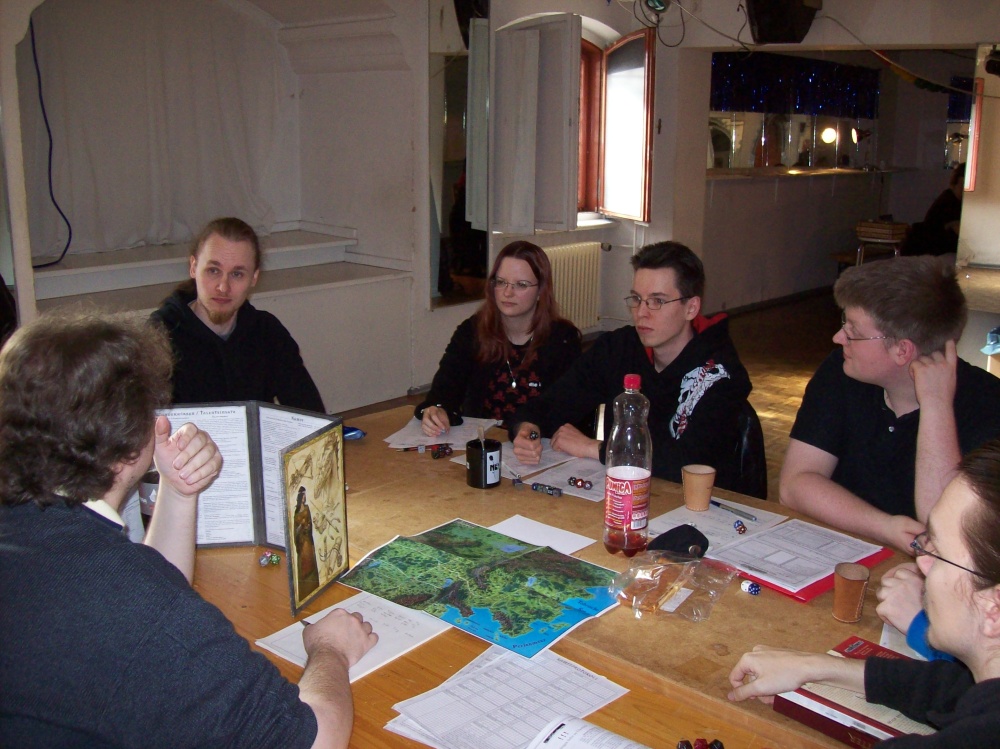 By Sargoth - Own work, CC BY-SA 3.0
By Sargoth - Own work, CC BY-SA 3.0Joe: If they get hooked and make it to
the start of Cannon Fodder, we talk about this question, or a variation
of it, a lot in Cannon Fodder. We really want people to be playing this
game, because most people just don’t know about it and they really
should. It’s such an absurd amount of fun…I wonder if it might be
illegal one day…that’s how fun it is.
As far as getting started, yes, there are online platforms, such as Roll20.net, where you can meet and play with people online with a video/audio feed and a shared “tabletop” board on the screen. If you live in or near a city, game stores tend to be a great hub of nerds trying to find people to play games with.
If you’re hesitant to sit with randos and act like a
wizard princess based on the main character from Frozen, you’re not
alone. Sometimes what you need is to meld into a larger group, that’s
what conventions are for. I never would have thought I’d find them so
fun, but I’ve been to a few gaming conventions now and
they happen
all over the US (not sure about Canada obviously) and I know that PAX
now has an Australia expo each year. I will credit the PAX East
convention in Boston with the reason I’m here doing this interview with
you today. I went up there because I thought it was just about new video
games coming out in 2010, and found out that half of the event, if not
more, was board games and RPGs. I jumped right in and never ended up
setting foot on the video game show floor. I met so many people that
were nerds like me, but were totally social and nice and fun and I just
had a blast. I can’t recommend conventions or expos highly enough. I’m
going to GenCon 50 with the Glass Cannon this August and I’m out of my
mind excited. I’ve never been and I can’t get there soon enough!
SBG: You
are both (Joe and Troy) experienced “game leaders.” Where should a new
or inexperienced game leaders go to learn the ropes above and beyond the
rule books? Are there any online communities that are especially
accessible?
Troy: We prefer the nomenclature Gamemaster
actually. (Snorts. Pushes glasses up bridge of nose.) That's the
Pathfinder term that we go by. The best way to begin to learn to GM is
to buy the Pathfinder Gamemastery Guide and give it a read through, but
the only real way to learn is to sit down and start playing. There are
countless message boards, websites and YouTube videos with tips and
tricks as well. Google "How to be a Gamemaster" and everything you need
to know to get started is a click away. Ultimately, though, the real
learning
can only come through sitting down, playing, making mistakes and
learning with your group. People should also just pop into their local
game stores. They probably have a Pathfinder night at least once a week,
if not more. There are also organized play events happening all the
time through the Pathfinder Society. Check out paizo.com for more
details.
Joe: Honestly, if you’ve never checked it out, you
need to read the Game Master’s Guide published by Paizo. It’s not
another rulebook. There are rules in there of course, but it’s really
very meta. It’s all about dealing with a layer of complexity outside of
the mathematical rules of the game. Things like players that are not
satisfied with the game, distractions in real life that take away from
the gameplay, and notes on writer’s tactics to create better conflict in
a story. I couldn’t even begin to list the amount of valuable
information in that book. We mention it over and over on Cannon Fodder. I
regularly just get it out and open to a random page and start reading
and I remember things I’ve forgotten that make me a better GM the next
session. It talks about fooling your players, finding the right energy
in the room, what to each and during a long session, what music would
set the tone for the players. It’s simply the best guide there is for
exactly this question.
That said, nothing is as valuable as
experience. GMing is very personal…you have to learn what works best for
you. It’s an intimating prospect, but don’t let that stop you! At some
point you’ve just got to jump in and take your lumps. Eventually, you’ll
get the hand of it and before you know it, you’ll be running games with
your books closed, straight from memory.
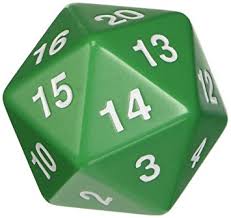
SBG: This question is
for Joe - a recurring theme on the Podcast is Troy's neon green 20-sided
die, which seems to roll a disproportionate amount of natural 20's. How
come you guys haven't tossed it in the microwave yet?
Joe:
Because it’s a sham. I’ll give you a peek behind the curtain here. The
notorious Neon Green d20 is not weighted. It’s Troy that’s one of the
luckiest people I’ve ever met. The Neon Green is only so lucky because
it’s the die that Troy rolls the most. If we microwaved it, the first
mundane white d20 he picked
up would roll an absurd about of natural
20s. I’ve played dozens of games with Troy besides Pathfinder and I can
attest that his luck runs through all manner, color, and size of dice. I
hate him.
SBG: Your Patreon campaign was, I'm going to say,
wildly successful - and fans like us are so happy for you. What are some
of the benefits new fans could have from supporting your Patreon page,
and what does the future of the Glass Cannon Podcast look like?
Troy: The world of gaming entertainment is the Wild West right now. With
online shows like Critical Role and HarmonQuest gaining popularity and
exposing tabletop role-playing games to a larger audience, I feel like
we're coming in at the perfect time. Ideally, we will continue to grow
into a network of podcasts, one for every day of the week, and
eventually expand into video content that becomes so popular, we can
just walk into Netflix and say, "Give us a deal!"
Joe: Not only will
supporters get free collectible Glass Cannon merchandise, but probably
most importantly to me, they will get additional content! I can’t say
yet what that content will be, but I can tease that it will be new
games, new characters, new GMs, new players, and more. And there will be
our first ever professionally produced video content, which I’m also
really excited about. At higher tiers we actually jump online and play
Pathfinder WITH you, running you through a game just as if you were on
the show…but this time a much longer 4-5 hour game!
As for
the future, we’ll take it as it comes. Right now, we’re focusing on
getting our donors the content and merchandise they deserve for so
generously supporting us. Once that train is rolling, though, it’s onto
the next thing, which I hope will be new additional one hour weekly
stories that run in addition to
our Giantslayer story and hopefully down the line a whole network of high quality roleplaying entertainment.
SBG: Thanks so much for doing this with us! Best of luck on the rest of your adventures!
Joe:
Thanks for having us, Daniel. I truly hope your readers give the show a
chance. As a low budget operation from the start, we’ve never been able
to market the show and we’ve only relied on word of mouth and generous
outreach from publications like yours that are willing to spread the
word for us.
We’re confident that once someone gives us a try, they’ll realize that the fun we’re having is infectious.

